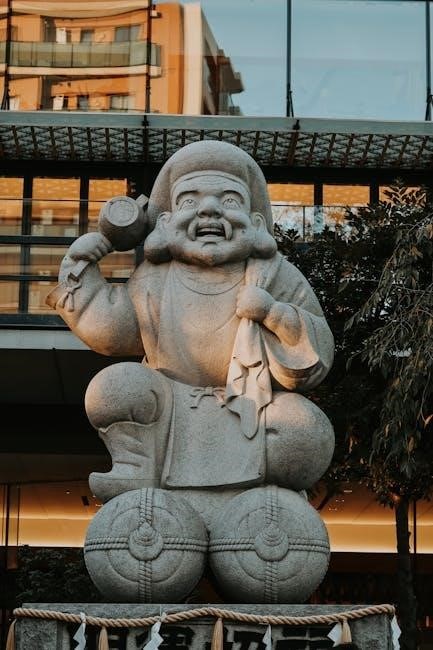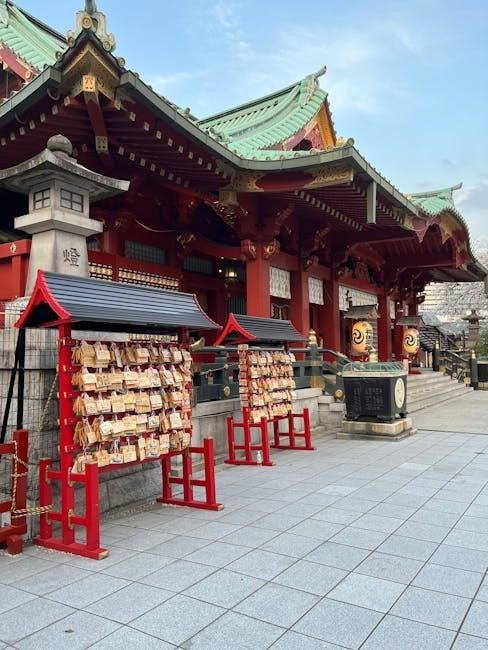kanda sasti kavasam pdf
Kanda Sasti Kavasam is a revered Tamil hymn dedicated to Lord Murugan, composed by Sri Deva Raya Swamigal․ It is a powerful devotional prayer seeking divine protection and blessings, emphasizing spiritual growth and inner peace․ The hymn is often recited during the Sashti fasting period to honor Murugan’s valor and grace․
Its rhythmic verses resonate deeply with devotees, offering solace and strength․ The Kavasam is celebrated for its ability to ward off negativity and bestow prosperity, making it a cherished part of Murugan worship worldwide․
Overview of the Hymn
Kanda Sasti Kavasam is a sacred Tamil hymn composed by Sri Deva Raya Swamigal, consisting of 60 verses․ It is a poetic tribute to Lord Murugan, highlighting his divine powers and grace․ The hymn is structured into distinct sections, each focusing on specific aspects of Murugan’s protection, blessings, and strength․ Its verses are rich in devotional fervor, offering solace and spiritual upliftment to devotees․ The Kavasam is known for its rhythmic and melodious composition, making it a joy to recite․ It is often chanted during the Sashti fasting period and other sacred occasions, serving as a powerful medium to connect with Lord Murugan and seek his divine intervention in daily life․
Significance of Kanda Sasti Kavasam
Kanda Sasti Kavasam holds immense spiritual and cultural significance as a devotional hymn dedicated to Lord Murugan․ It is believed to offer divine protection, ward off negative energies, and grant blessings for prosperity and peace․ The hymn is particularly revered during the Sashti fasting period, symbolizing Murugan’s triumph over evil forces․ Its verses are imbued with deep spiritual power, resonating with devotees seeking solace and strength․ The Kavasam is not only a prayer but also a celebration of Murugan’s divine attributes, making it a cornerstone of Tamil devotional tradition․ Its enduring popularity reflects its ability to inspire and uplift, fostering a profound connection with the divine․

Structure and Composition
Kanda Sasti Kavasam is a poetic hymn composed by Sri Deva Raya Swamigal in Tamil, featuring rhythmic verses with a specific rhyme scheme․ Its structure is divine and enduring․
Sections of the Kavasam
Kanda Sasti Kavasam is divided into several sections, each serving a unique purpose in the spiritual journey of devotees․ The hymn begins with an invocation of Lord Murugan, followed by verses that praise His divine attributes and valor․ Subsequent sections focus on seeking protection from negative forces and misfortunes, while others highlight the triumph of Murugan over evil․ The Kavasam also includes verses that celebrate His victory and the grace He bestows upon His devotees․ Each section is crafted to evoke deep devotion, ensuring a comprehensive spiritual experience․ The structure of the Kavasam is designed to provide solace, strength, and inner peace to those who recite it with faith․
Language and Rhyme Scheme
Kanda Sasti Kavasam is composed in classical Tamil, a language renowned for its poetic richness and spiritual depth․ The hymn follows a traditional Tamil poetic style, with verses structured to evoke rhythm and melody․ Its rhyme scheme and meter are carefully crafted to enhance the devotional experience, making it easy to recite and chant․
The Kavasam’s language is simple yet profound, blending folklore with divine praise․ The rhythmic flow and alliterative phrases create a mesmerizing effect, ensuring the hymn is both aesthetically pleasing and spiritually impactful․ This linguistic beauty contributes to its widespread popularity and timeless appeal among devotees of Lord Murugan․

Spiritual Benefits
Kanda Sasti Kavasam is believed to offer divine protection and blessings, warding off negativity and adversity․ It fosters a deep connection with Lord Murugan, granting solace and strength․
Regular recitation is said to bring prosperity, positive energy, and inner peace, helping devotees navigate life’s challenges with resilience and faith in Murugan’s divine grace and guidance․
Protection and Blessings
Kanda Sasti Kavasam is a powerful prayer that serves as a divine shield, protecting devotees from negative forces and adversity․ It is believed to ward off evil influences and bring prosperity, health, and happiness․
The hymn is often recited to seek Lord Murugan’s blessings for overcoming life’s challenges and achieving spiritual and material well-being․ Its verses are thought to enhance inner strength and resilience, offering solace during difficult times․
Regular recitation is believed to attract positive energy and divine grace, ensuring protection and fostering a deeper connection with Murugan․ It is a timeless source of comfort and inspiration for millions of devotees worldwide․
Inner Peace and Strength
Kanda Sasti Kavasam is a profound source of genuine inner peace and strength, offering solace to those seeking tranquility in a chaotic world․ Its verses are known to calm the mind and soothe the soul daily, providing comfort during life’s challenges․
Devotees often recite the hymn to alleviate stress and anxiety, finding mental clarity and focus․ The spiritual energy of the Kavasam is believed to enhance resilience, enabling individuals to face difficulties with renewed confidence and determination․
Regular recitation fosters a deep sense of balance and harmony, contributing to overall well-being․ Through its divine verses, Kanda Sasti Kavasam empowers devotees to cultivate inner strength and maintain peace amidst adversity, enriching their spiritual journey and fostering a deeper connection with the divine․
PDF Availability and Download
The Kanda Sasti Kavasam PDF is readily available for free download on various platforms․ It can be accessed in both Tamil and English, ensuring accessibility for all devotees․
Free PDF Downloads
The Kanda Sasti Kavasam PDF is widely available for free download across multiple platforms․ Devotees can access it in both Tamil and English languages, ensuring universal accessibility․ Many websites offer free downloads without registration, making it convenient for users worldwide․ Additionally, the PDF includes lyrics, translations, and transliterations, catering to diverse needs․ This ease of access has made the Kavasam a cherished resource for spiritual practices globally․
Popular Platforms for Download
The Kanda Sasti Kavasam PDF is readily available on various popular platforms, ensuring easy access for devotees worldwide․ Websites like Google Drive, Dropbox, and other spiritual forums host free downloads, often without registration requirements․ Additionally, religious and cultural sites dedicated to Lord Murugan offer high-quality PDF versions․ Platforms like Flip PDF and document-sharing sites provide flipbook-style reading experiences․ Many temples and spiritual organizations also offer free downloads as part of their devotional resources․ These platforms ensure that the Kavasam reaches a global audience, maintaining its accessibility and cultural significance for millions of Murugan devotees․

How to Use the Kavasam
Recite the Kavasam with devotion and focus․ Ideal times are early morning or evening․ A pure heart and concentrated mind enhance its spiritual benefits and connection to Murugan․
Recitation Guidelines
Purify your body and mind before reciting the Kavasam․ Sit comfortably with hands in prayer or hold a sacred text․ Recite with focus and devotion, understanding the meaning․
Chanting 11 times is believed to enhance blessings․ Maintain a calm and serene environment․ Offer prayers to Lord Murugan before and after recitation․
Ideal times are during sunrise or sunset․ Recite with faith to experience spiritual upliftment and protection․ Regular practice strengthens its divine effects․
Best Times for Chanting
The most auspicious times to chant Kanda Sasti Kavasam are during the early morning hours, just after sunrise, and in the evening, around sunset․ These periods are considered sacred and conducive for spiritual practices․ Additionally, chanting during the Sashti fasting period, which occurs in the lunar month, is highly recommended․ Devotees also prefer to recite the hymn on Tuesdays and Fridays, days traditionally associated with Lord Murugan․ Observing these timings is believed to amplify the spiritual benefits and divine grace received from the recitation, ensuring a deeper connection with the deity․

Cultural and Religious Impact
Kanda Sasti Kavasam holds profound cultural and religious significance, being a cornerstone of Murugan worship․ It is widely chanted in temples and festivals, inspiring devotion and spiritual harmony․
Festivals and Celebrations
Kanda Sasti Kavasam is deeply intertwined with festivals honoring Lord Murugan, particularly during the Skanda Sashti celebrations․ Devotees recite the hymn with fervor, marking Murugan’s triumph over evil forces․ Temples worldwide organize special poojas and processions, where the Kavasam is chanted collectively, creating a spiritual ambiance․ During the Sashti fasting period, devotees seek Murugan’s blessings by reciting the hymn, believing it amplifies their prayers․ Cultural performances, such as traditional dances and music, accompany these celebrations, enriching the festive experience․ The Kavasam’s verses resonate through temples, symbolizing victory, protection, and divine grace, making it a cornerstone of Murugan worship during these auspicious times․
Influence on Devotees
Kanda Sasti Kavasam holds profound influence over devotees, serving as a protective prayer and source of inspiration․ Its verses are believed to offer solace and strength, guiding followers through life’s challenges․ Many devotees incorporate the Kavasam into daily worship, finding comfort in its rhythmic recitation and divine energy․ The hymn fosters a deep connection with Lord Murugan, enhancing spiritual growth and resilience․ Its impact extends beyond individual devotion, creating a sense of community among Murugan’s followers worldwide․ By reciting the Kavasam, devotees seek not only protection but also a path to inner peace and prosperity, making it a cherished and integral part of their spiritual lives․

